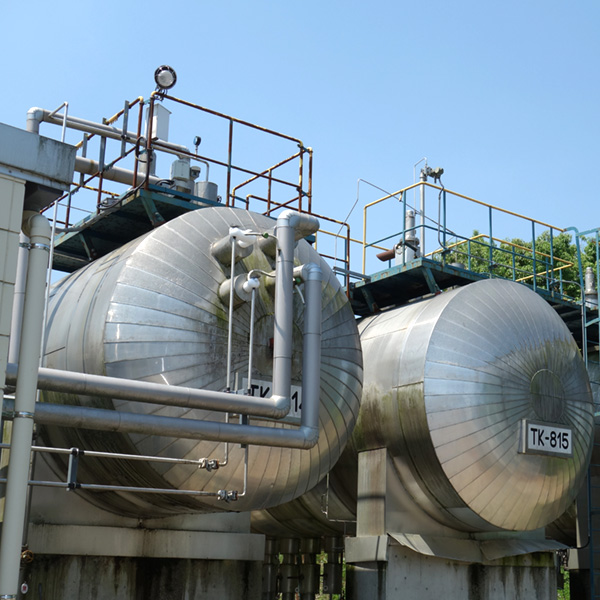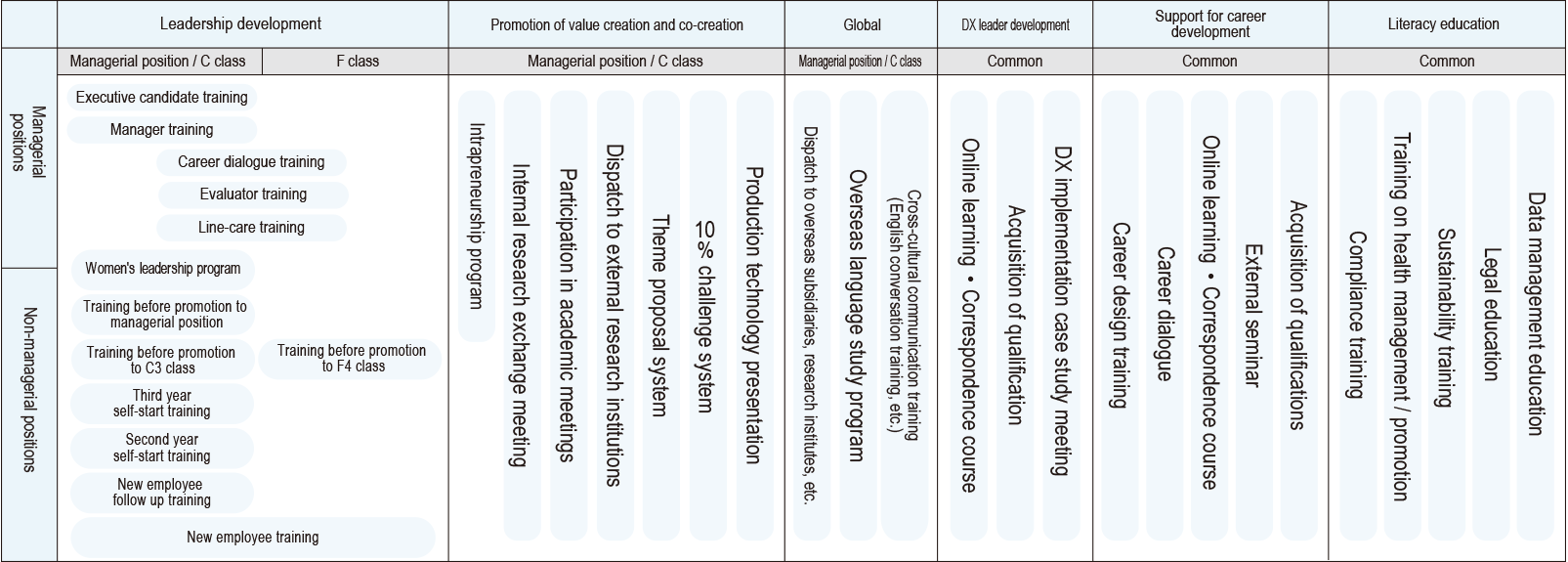
Sustainability
Strengthening of Nissan Group's business base
- HOME >
- Sustainability >
- Strengthening of Nissan Group's business base >
- Personnel Retention and Trainings
Personnel Retention and Trainings
Policy/Philosophy
At our company, we are promoting various human resource development initiatives in order to advance human capital management. Underlying these efforts are three key principles for nurturing talent: (1) Producing leading human resources who will continue to challenge to improve value, (2) Producing co-creators who transcend domains, and (3) Producing discerning human resources who able to judge business potential and commercialize it. We believe it is essential for human resource development that “each employee should continue to educate themselves voluntarily in their efforts to develop themselves." We appreciate value an environment and corporate culture where individuals with a sense of career development consciousness autonomously collaborate across departments and expertise boundaries, enabling continuous growth. Therefore, we have implemented a wide range of measures, such as building a system that creates two-way communications within and across divisions, and actively dispatching employees to external research institutions and overseas company bases.
Indicators
Human Resource Development
| Indicator | Scope | Unit | FY2021 | FY2022 | FY2023 | FY2024 |
|---|---|---|---|---|---|---|
| Average training and development hours per full-time employee | non-consolidated | Hours | 9 | 5※ | 9 | 10 |
- In FY2022, some of training programs was postponed due to personnel system revisions.
Activities
We aim to cultivate an organizational culture where diverse talents co-create while enjoying innovative challenges, in order to realize ideal state in 2050. To accomplish this, we are implementing the following new initiatives:
- Human resource development in accordance with expected roles to realize "A group of co-creators that face challenges for change with a strong passion"
- Introduction of a career design program to promote individual "challenges," called the 10% Challenge (a system where individuals can tackle themes of their own choosing using 10% of their regular working hours)
- Strengthening the early development of management talents, business creation talents, and global talents.
Fair Personnel Evaluation
We have positioned dialogue as a means of “communication to overcome conflicts and co-create by freely communicating with each other”, and we are striving to improve the quality and speed of business through the management of objectives.
In addition to this target management, our evaluation system is designed to enable employees to develop their strengths and demonstrate their personality through two-way communication between themselves and their superiors so that “self-independent individual” realizes how one wants it to be, thereby enabling them to work with enthusiasm while realizing growth. We are enhancing transparency and employees’ satisfaction, and strive to fairly evaluate personnel according to results and contributions.
The final evaluation is fed back by the Personnel Department to the department, the secondary evaluators, the primary evaluators, and the employees under the four objectives of 1) to motivate them to take on challenges, 2) to improve their satisfaction, 3) to foster a sense of human resource development among their superiors, and 4) to clarify their development items of competency.
In our annual evaluator training sessions, we aim to educate evaluators on two main objectives: (1) understanding the role and significance of the evaluation system within the personnel system, and (2) creating mechanisms for the appropriate operation of the evaluation system as the cornerstone of talent development. Evaluators are trained to grasp the basics of evaluation that they should be aware of, and are then educated on evaluation methods, key points for providing appropriate feedback, and other related topics.
Training and Capability Development
Educational Training System
List of training programs (implemented in FY2024)
| Name | Content | Number of trainees | Period | Number of training days |
|---|---|---|---|---|
| New employee training | Penetration of corporate philosophy and policy / Education of expertise / Development of communication skills / Vision setting | 42 | 2 weeks | 9 days |
| New employee follow up training | Motivation control / Mindset for proactive action | 52 | - | 2 days |
| Second year self-start training | Engagement in Self-Selected Challenges, Research Paper Writing, and Results Presentation | 32 | 7 months | 1 day |
| Third year self-start training | Engagement in Self-Selected Challenges, Research Paper Writing, and Results Presentation | 27 | 7 months | 1 day |
| Training before promotion to C3 class / Managerial position | Development of the future-creating leadership (problem-solving capabilities, and rapid hypothesis-testing capability), and Strategic Proposals to Executives for Driving Transformation | 50 38 |
5 months | 12 days |
| Intrapreneurship Program | Developing Talent for New Business Creation and Driving Innovation Initiatives | 8 | 8 months | 34 days |
| Evaluator training | Understanding of the evaluation system and acquisition of evaluation methods | 54 | - | 1 day |
| Career Dialogue Training | Acquisition of career support methods | 49 | - | 1 day |
| Career Design Training by Age Group (Young Employees) | Promoting Career Ownership and Personal Growth | 39 | 3 months | 1 days |
| Manager Training Program | Enhancement of Organizational Management Skills and Development of New Professional Networks | 22 | 7 months | 10 days |
| Line Care Training | Supporting Subordinates' Mental Health and Improving the Workplace Environment | 35 | - | 1 day |
| Correspondence course | Improvement of business execution capability | 497 | - | - |
Self-start training
For the purpose of laying a foundation for self-driven employees who proactively think and act, new employees engage in a two-year training program that focuses on creating and implementing original plans. Throughout the training, each employee is supported by a work implementation mentor (primarily senior colleagues) and a supervisor (primarily direct managers) to help shape and realize their ideas. Additionally, senior employees from other departments related to the participant’s theme serve as advisors. By receiving advice from various perspectives, employees develop high-quality proposals that incorporate diverse viewpoints.
At the end of each fiscal year, participants compile their work into a paper and gather with colleagues from diverse professional fields for a discussion forum. This event serves both as a culmination of their efforts and as an opportunity to gain new insights through active debate.
This cross-divisional training serves as a driving force for future innovation. Ideas proposed by young employees during the training are often adopted and applied in subsequent projects.
Overseas language study program
In order to collaborate with people with diverse backgrounds, we believe it is important not only to enhance communication skills but also to create deeper mutual understanding by sharing the cultural background and values of the other party.
Therefore, we have introduced an overseas language study program with the aim of having employees learn by experiencing and following different cultures.
While trainees diving into different cultures and experiencing language barriers, by independently continuing to communicate with people with various thoughts and ideas, we have been able to clearly see the growth of each trainee.
Since the program started in 2014, a total of about 46 employees have dispatched to 12 cities in 7 countries. Following their return, many of the trainees have expanded their opportunities for success by involving overseas business, thus significantly influencing their subsequent career development.
Awards Program
Every year we grant awards to employees who have made beneficial inventions, devised improvement measures, or made remarkable achievements and contributions. Regarding intellectual properties, we also reward excellent inventions selected from among patent-pending inventions at an early stage in an effort to create greater incentive for R&D, discover excellent inventions and improve upon their quality and creativity.
FY2024 Award (Award-winning projects: FY2023)
| Name | Presenter | Content | Number of awards | Number of rewarded |
|---|---|---|---|---|
| Central Awards Division Awards Office Awards |
President and COO Head of each division Head of each office |
Commend employees who have made beneficial inventions, devised improvement measures, or made remarkable achievements and contributions. | 1 1 3 |
4 6 42 |
| Rewards for Excellent Inventions | Officer in charge of Intellectual Property Department |
Reward excellent inventions at an early stage to promote the improvement of R&D capabilities. Rank S rewards are granted to more excellent inventions. | 7 (S : 3) |
31 |






